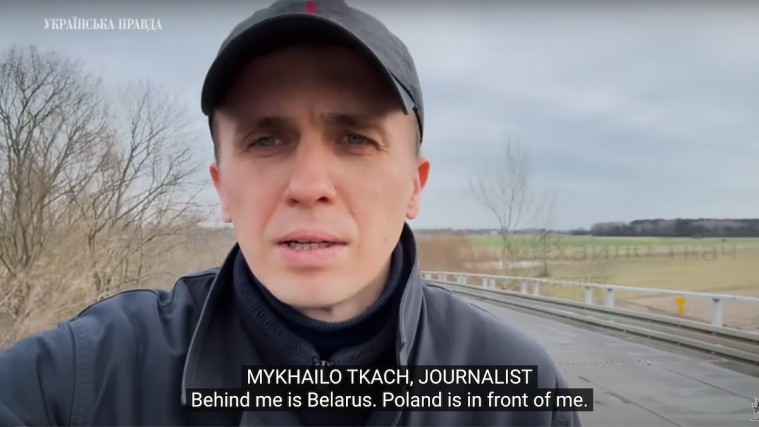New York, March 18, 2024—Polish authorities should refrain from detaining members of the press reporting on topics of public interest, as two separate groups of Ukrainian reporters were blocked from reporting on Poland’s borders, the Committee to Protect Journalists said Monday.
On February 27, Polish police detained reporter Mykhailo Tkach and cameraman Yaroslav Bondarenko, from the independent news website Ukrainska Pravda, near the eastern Polish city of Łuków, while they were reporting on agricultural trade between Poland and its eastern neighbors Russia and Belarus, according to news reports andUkrainska Pravda Chief Editor Sevgil Musaieva, who spoke to CPJ.
Separately, on March 7, Polish law enforcement officers detained editor Yuriy Konkevych and camera operator Oleksandr Pilyuk, from the Ukrainian news agency Rayon.in.ua, while they were reporting on freight traffic on the Polish-Russian border and deported them to Ukraine on March 9, according to the National Union of Journalists of Ukraine and multiple news reports.
“CPJ is concerned by Poland’s detention, in the span of two weeks, of four Ukrainian journalists who were investigating the country’s trade with Russia,” said Gulnoza Said, CPJ’s program coordinator for Europe and Central Asia. “Journalists should be able to report on matters of public interest without fear of detention or deportation.”
Polish farmers have been blocking border crossings with Ukraine, as they say cheap Ukrainian grain is flooding their market since customs duties were waived after Russia’s full-scale invasion of Ukraine in 2022.
Tkach and Bondarenko showed their journalistic credentials to the police officers who had approached their car, those sources said. “They began grabbing our cameras and looking around,” Tkach told his outlet, adding that around 10 police officers searched their car and seized “all of the phones, documents, and memory cards from the cameras.”
Police officers then took Tkach and Bondarenko to the police commandant’s office in Łuków and, along with agents with the Polish special services, questioned the journalists about their sources, he said.
Tkach and Bondarenko were released after the Ukrainian ambassador to Poland intervened, having been kept at the office for over four hours, the Ukrainska Pravda report said. Their property was returned but some footage had been deleted from their memory cards, and the battery charger was damaged, it said.
The police of Lublin province, where Łuków is located, said on X, formerly Twitter, that they took action to “establish” the journalists’ identities and then allowed them to leave the station.
The Ukrainian press freedom group Institute of Mass Information (IMI) quoted Poland’s Lublin provincepolice as denying that they seized phones and other personal belongings from the journalists, saying that they only “inspected” the contents of the journalists’ car after receiving a report that two men were using a drone and cameras near the railway track.
“They have cameras everywhere in the commandant’s office, and if they look at a video or are interested in it, they will see everything,” Tkach told IMI.
Tkach, an investigative reporter, has previously been surveilled and harassed in connection with his work. On March 16, police in the western city of Uzhhorod came to Tkach’s hotel at 2:40 a.m. following a complaint from a local MP, the subject of a recent Ukrainska Pravda investigation, who claimed that he had been followed, Tkach reported on Facebook.
In the second incident, around five or six police officers detained Konkevych and Pilyuk in the Polish town of Braniewo, searched their car, and seized the journalists’ phones, memory cards, microphones, camera, and laptop, Rayon.in.ua said, adding that the police did not inform the consul or allow the reporters to call Ukraine.
Braniewo is about 70 kilometers (43 miles) southwest of Kaliningard, a Baltic Sea port that became part of Russia after the collapse of the Soviet Union, although it is geographically separate from Russia and borders Poland and Lithuania.
The journalists were detained for “spending too much time photographing critical infrastructure” in the area, “namely Russian liquefied gas railcars,” the report said.
Konkevych told IMI that “various Polish services” interrogated him and Pilyuk on March 7 and March 8, before the Polish Internal Security Service ordered their deportation as “persons who threaten the national security of Poland,” without providing further details. Their personal belongings were returned, but not their professional equipment, he said.
Rayon.in.au has started the process of appealing the deportation, which prohibits the journalists from visiting for five years the 27 European Schengen area countries where border controls have been abolished, and demanded the return of their equipment, its director Ihor Denisevich said in a statement.
CPJ’s text messages to Rayon.in.ua and email to Polish police requesting comment on the journalists’ arrests did not receive any replies.
